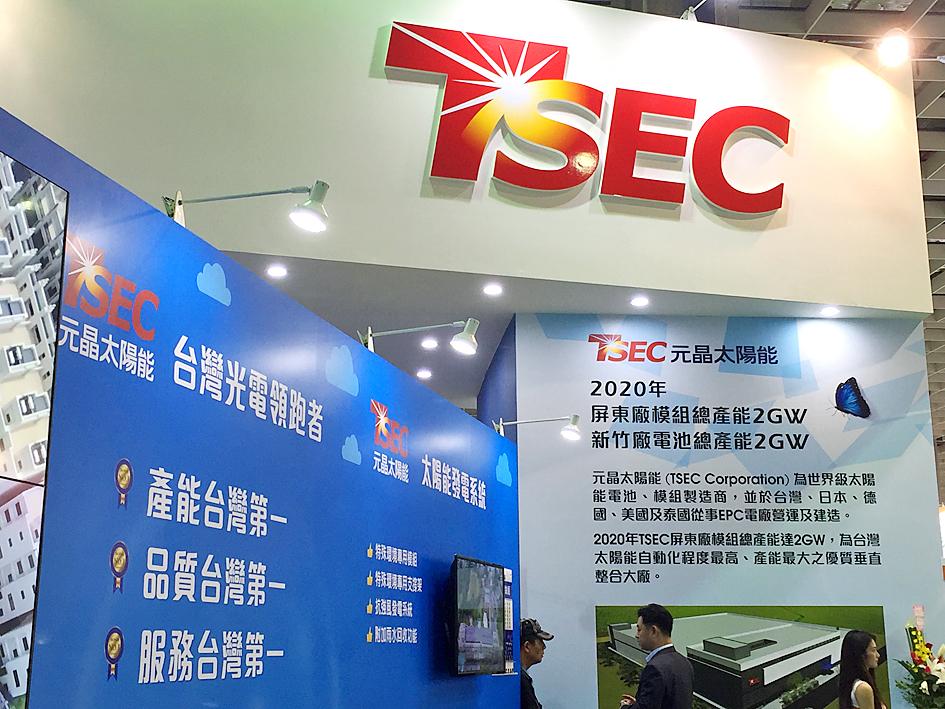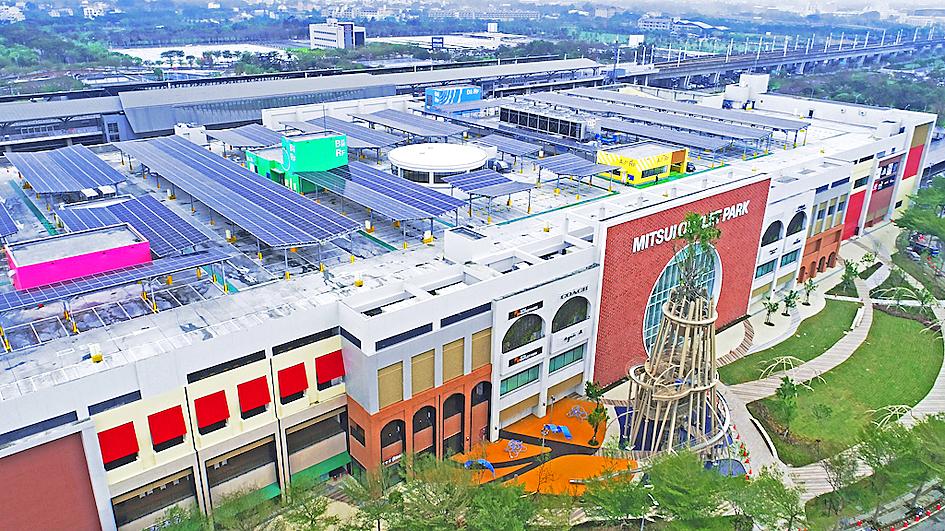Solar cell and module supplier TSEC Corp (元晶太陽能) has pledged NT$1.4 billion (US$50 million) to install new production lines at its plants in Hsinchu and Pingtung counties after the InvesTaiwan Service Center approved its application to participate in the government program, the Ministry of Economic Affairs said on Friday.
It was the company’s second application that was approved since it in December 2020 invested NT$700 million to set up large-scale solar cell and high-efficiency solar module production in Hsinchu’s Hukou Industrial Park (湖口工業區).
The new investment comes as demand from home and overseas markets for solar cells and modules has continued to grow due to many governments’ efforts to generate more energy from renewable sources and achieve carbon neutrality.

Photo: Chang Huei-wen, Taipei Times
“As carbon neutrality is a trend in international energy policy, demand for green energy is growing explosively and it is expected to have a promising outlook for the photovoltaic [PV] market in the long term,” the ministry said in a statement.
TSEC is planning to build a second production line for solar cells at its plant in the Hukou Industrial Park, as well as construct a fourth production line and a new warehouse building at its solar module plant in Pingtung’s Daching Industrial Park (大慶工業區), the ministry said.
“The new investment is estimated to increase the company’s annual production capacity by 400 megawatts [MW] to 1,300MW and help the government achieve net zero carbon emissions by 2050,” the ministry said.

Photo courtesy of New Green Power Co
Separately, New Green Power Co (永鑫能源), a PV systems company, said it has again cooperated with Mitsui Fudosan Co, to build rooftop solar systems at the Japanese real-estate developer’s new shopping mall in Tainan, following an earlier project in Taichung.
The new Mitsui Outlet Park in Tainan’s Gueiren District (歸仁) has an installed capacity of 2.3MW and would generate about 4 million kilowatt-hours (kWh) of energy per year, enough to supply 1,100 households, the Taipei-based solar company wrote on LinkedIn.
“The Mitsui Outlet Park Tainan is the third outlet park built by Mitsui Fudosan, and it is their second project combining a shopping mall and a solar power plant after the Mitsui Outlet Park Taichung,” New Green Power said on Saturday, one day after the new shopping mall’s formal opening.
New Green Power acted as the engineering, procurement and construction company for the Tainan project, providing end-to-end solar energy services, including designing the solar systems, giving procurement details and installing the panels.
The Tainan project includes PV panels installed on the main roof of the shopping mall, as well as in the mall’s parking lots, the company said.
Construction started in December last year and the panels are expected to be connected to the grid next month, the company said.
The project is designed to reduce annual carbon emissions by an estimated 2,100 tonnes, equivalent to 118,000 trees planted or five times the amount that Taipei’s Daan Forest Park (大安森林公園) can absorb in a year, it added.
New Green Power first cooperated with the Japanese developer to built rooftop and parking lot PV panels in the Mitsui Outlet Park at the Port of Taichung, which opened in March 2019.
The Taichung project has an installed capacity of 4.6MW and reduces annual carbon emissions by 3,349 tonnes, it said.

Hon Hai Precision Industry Co (鴻海精密) yesterday said that its research institute has launched its first advanced artificial intelligence (AI) large language model (LLM) using traditional Chinese, with technology assistance from Nvidia Corp. Hon Hai, also known as Foxconn Technology Group (富士康科技集團), said the LLM, FoxBrain, is expected to improve its data analysis capabilities for smart manufacturing, and electric vehicle and smart city development. An LLM is a type of AI trained on vast amounts of text data and uses deep learning techniques, particularly neural networks, to process and generate language. They are essential for building and improving AI-powered servers. Nvidia provided assistance

GREAT SUCCESS: Republican Senator Todd Young expressed surprise at Trump’s comments and said he expects the administration to keep the program running US lawmakers who helped secure billions of dollars in subsidies for domestic semiconductor manufacturing rejected US President Donald Trump’s call to revoke the 2022 CHIPS and Science Act, signaling that any repeal effort in the US Congress would fall short. US Senate Minority Leader Chuck Schumer, who negotiated the law, on Wednesday said that Trump’s demand would fail, while a top Republican proponent, US Senator Todd Young, expressed surprise at the president’s comments and said he expects the administration to keep the program running. The CHIPS Act is “essential for America leading the world in tech, leading the world in AI [artificial

DOMESTIC SUPPLY: The probe comes as Donald Trump has called for the repeal of the US$52.7 billion CHIPS and Science Act, which the US Congress passed in 2022 The Office of the US Trade Representative is to hold a hearing tomorrow into older Chinese-made “legacy” semiconductors that could heap more US tariffs on chips from China that power everyday goods from cars to washing machines to telecoms equipment. The probe, which began during former US president Joe Biden’s tenure in December last year, aims to protect US and other semiconductor producers from China’s massive state-driven buildup of domestic chip supply. A 50 percent US tariff on Chinese semiconductors began on Jan. 1. Legacy chips use older manufacturing processes introduced more than a decade ago and are often far simpler than

Gasoline and diesel prices this week are to decrease NT$0.5 and NT$1 per liter respectively as international crude prices continued to fall last week, CPC Corp, Taiwan (CPC, 台灣中油) and Formosa Petrochemical Corp (台塑石化) said yesterday. Effective today, gasoline prices at CPC and Formosa stations are to decrease to NT$29.2, NT$30.7 and NT$32.7 per liter for 92, 95 and 98-octane unleaded gasoline respectively, while premium diesel is to cost NT$27.9 per liter at CPC stations and NT$27.7 at Formosa pumps, the companies said in separate statements. Global crude oil prices dropped last week after the eight OPEC+ members said they would